QuestionHi Tabbi,
My question is similar to Joy's, except that my miscreants are definitely young kitties. They are brother and sister, about six months old. The male is neutered and the female will be spayed by the end of this week. They share my house with three older cats.
The two young ones have both urinated and defecated outside the box since they were babies; the male is particularly prone to do this. Both have improved as they have gotten older, but accidents still happen occasionally. I keep the boxes clean, scooping twice a day, and I have finally found a type of litter they seem to like (Fresh Step with carbon crystals). I should mention that both kittens have VERY loose stools. The vet says this is most likely due to irritation by their dry cat food, usually Special Kitty or 9 Lives, but I can't afford a more expensive brand.
Here are a few other facts: All of my cats are indoor pets. My floors are all hardwood, except for one carpeted bedroom. They don't pee in that bedroom, but the male and one of the older females sometimes urinate on my bed--the proverbial peeing contest. Also, I've had the kittens since they were about 6 weeks old; they were abandoned in my neighborhood.
I never intended to have 5 cats, but I love them all dearly, and I interact with each of them on a daily basis. Is there anything I can do to discourage the kittens from going outside the box, beyond what I'm already doing? I don't rent, thank goodness, but I am truly tired of a house that smells bad.
Thank you for your help!!!
AnswerLinda,
I would not feed Special Kitty to any cat! Wal-Mart still periodically has recalls on it. Kittens need Kitten Chow for the first year. It has the extra protein, vitamins, etc. that they while they are growing.
There are many reasons for cats and kittens to eliminate inappropriately. Lots of times it is because the kittens were weaned too early and mother cat did not have a chance to teach them 'life skills' and correct behavior, including where to go potty and/or how to use the litterbox.
Since I cannot put all the information in this reply, I am including some links to good articles about improper elimination. Please read them. They will have good information that you should find helpful in dealing with the kitten's behavior.
(copy and paste or type the whole links into your address bar)
http://cats.about.com/cs/behavioralissues/a/outsidebox_two.htm
http://www.geocities.com/heartland/pointe/9352/litterboxhelp.html
http://www.secretsofcats.com/behavior/peeing-pooping-problems.html
Here are some suggestions too:
Some cats prefer privacy and don't like to use a litterbox that is out in the open. Try a larger litterbox with deeper litter. Sometimes that will help. Or try using children's play sand that you can get at Home Depot, or other building supply store. If the kittens use the sand then you can gradually add regular litter.
You may want to try putting puppy pee-pads (the ones used for puppy potty training or the human kind they put under older people in their beds when they are incontinent)down next to the litterbox. If they use those, it won't leak to the floor.
Here is a 'recipe' for cat urine odor removal:
1 quart of 3% hydrogen peroxide
1/4 cup baking soda
1 teaspoon of liquid soap
(3% hydrogen peroxide can be bought at most grocery and drug stores in pint and quart bottles).
Gently mix all ingredients in a non-metal container. Do not mix or shake vigorously!
The mixture is best used when fresh but can be stored. Do not keep mixture in an airtight container. Have a VERY loose lid as baking soda and hydrogen peroxide when mixed together will release oxygen and an airtight container will explode. You can mix and keep it in large spray bottle (Home Depot, etc.) but a plastic liter or 2-liter soda bottle works just a well.
Always test for color-fastness. Hydrogen peroxide is a bleaching agent in stronger concentrations and can lighten materials that are not color-fast.
CLOTHING, COMFORTERS, AND BEDDING:
Put the items in the washing machine and pour in enough of the recipe to cover thoroughly. This might take a few gallons depending on the size of the load. Soak for at least 24 hours. Rinse and rewash using normal washing detergent. If any of the odor is still present, soak again for 24 hours, rinse and rewash.
A small area on a comforter can be spot treated by saturating the area thoroughly, letting it dry for 24 hours, then washing the comforter normally in the washer with detergent. Always check for color-fastness before using.
MATTRESSES, SOFAS, PILLOWS
For mattresses you must saturate the spot thoroughly to get deep down into the padding and springs to neutralize the urine. If the cat has urinated alot in one spot, the mattress can be soiled all the way to the other side! Let the area dry for 24-48 hours without bedding then reapply if necessary.
For sofas the same directions as above apply but always check for color-fastness in a hidden area before using. Cotton is used in alot of upholstery fabrics and is easily bleached. If your sofa pillow cushion covers can be unzipped and taken off (must be color-fast and washable) you can put them in the washing machine. See How to Remove from Clothing, Comforters and Bedding for instructions.
HARDWOOD FLOORS
When cat urine seeps into wood flooring it causes the fibrous cells in wood to swell and warp ruining the flooring planks. The only way to fix this is by replacing the wood. Depending on the extent of damage from cat urination this can mean replacing only a section or the whole floor. This can be an expensive project!
If you can't afford to replace the wood flooring right away, you can treat the wood with the recipe but remember wood is preamable and it could make the wood swell further, causing further damage. You will have to decide whether you can live with the odor or not, before replacing the flooring.
------------------------------
Recipe 2:
You can also use a solution of 50% white vinegar and 50% water. Allow to dry. Then apply a liberal amount of baking soda over the area and drizzle it with a quarter of a cup of hydrogen peroxide mixed with a teaspoon of dishwashing detergent.
The acidity of the vinegar will neutralize the ammonia in the cat urine. Hydrogen Peroxide is a powerful oxidizer capable of killing bacteria which cause the urine smells. Baking soda is a well known deodorizer which absorbs odors.
Never use ammonia or ammonia-based products. One of the ingredients of urine is ammonia which can make the cat keep going in the same area.
------------------------------
Also here are a couple of links to good articles about cleaning and/or deodorizing cat 'accidents':
http://www.catsofaustralia.com/clean-cat-urine-mattress.htm
http://cats.about.com/cs/cleaningmesses/a/cleaningmesses.htm
I hope this helps.

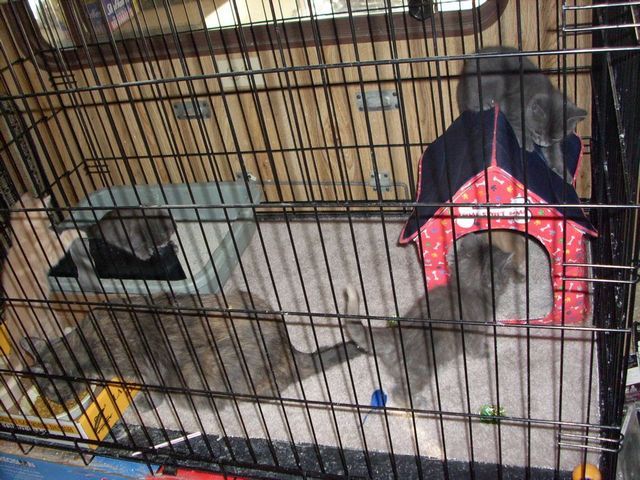 Aggressive new cat
QuestionDear Tabbi,
We have rescued many c
Aggressive new cat
QuestionDear Tabbi,
We have rescued many c
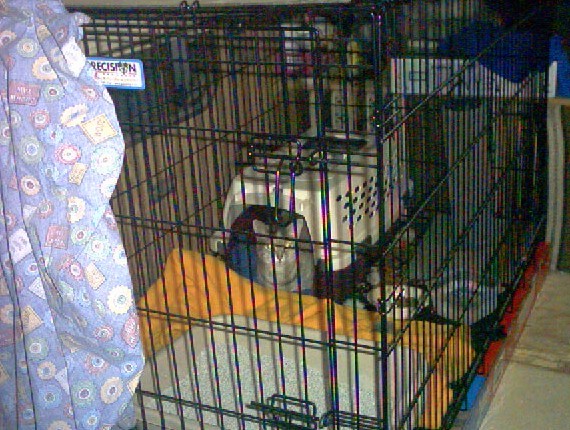 my cat is behaving out of sorts
QuestionQUESTION: hi
i recently moved, and whereas my c
my cat is behaving out of sorts
QuestionQUESTION: hi
i recently moved, and whereas my c
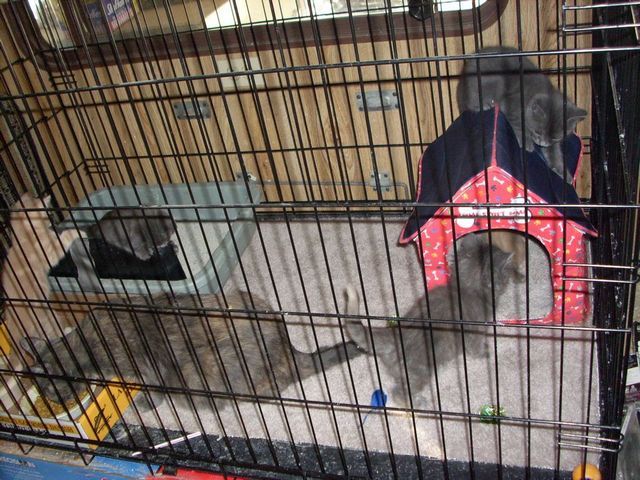 Neutred female with 6 moth non-neut male
QuestionOur female cat love our other white male, both
Neutred female with 6 moth non-neut male
QuestionOur female cat love our other white male, both
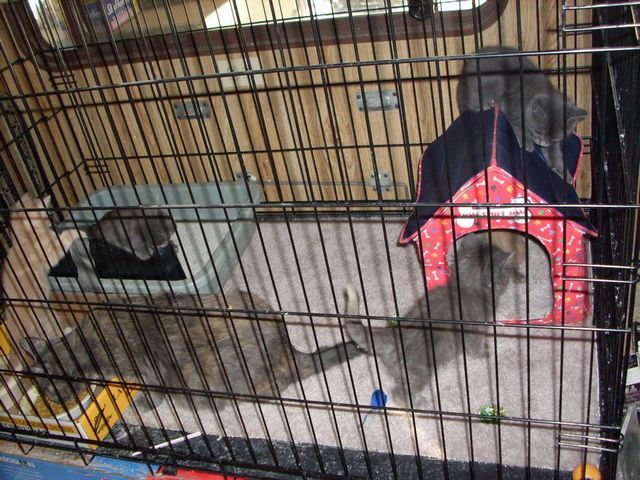 cat-astrophic
QuestionWe adopted a 16 month old cat/kitten, we alread
cat-astrophic
QuestionWe adopted a 16 month old cat/kitten, we alread
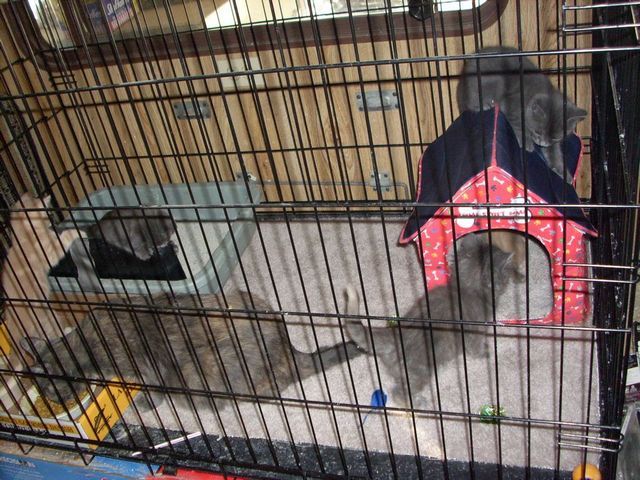 Introducing Kitten to Solitary Cat
QuestionI just got a 13 week old kitten who is really f
Introducing Kitten to Solitary Cat
QuestionI just got a 13 week old kitten who is really f